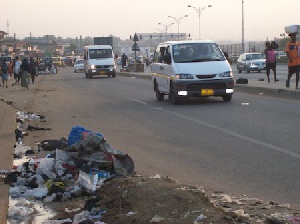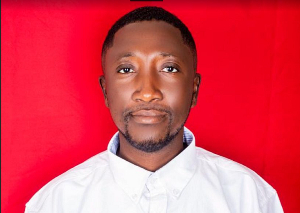- Home - News
- TWI News | TV
- Polls
- Year In Review
- News Archive
- Crime & Punishment
- Politics
- Regional
- Editorial
- Health
- Ghanaians Abroad
- Tabloid
- Africa
- Religion
- Election 2020
- Coronavirus
- News Videos | TV
- Photo Archives
- News Headlines
- Press Release
General News of Saturday, 25 July 2015
Source: www.ghanaweb.com
Editorial: 7th dirtiest country and gunning for 1st?
It is difficult if not unthinkable to have an average Ghanaian home that does not generate 'borla,' the colloquial Ghanaian terminology for refuse, rubbish, garbage.
Today, most Ghanaian homes aggregate rubbish in home corners and wait for the very unreliable refuse collectors to come by and pick them. Unreliable because refuse stays in our homes for so long and it is becoming the new norm, sadly so.
We do not need rocket scientists to draw our attention to the fact that with population growth, our consumption rises and there certainly is a commensurate effect on the refuse generation. It is clear that someone did not plan for today.
The end result? We are ranked 7th dirtiest country in a Joint Monitoring Programme report, "Progress on Sanitation and Drinking Water: 2015 Update and MDG Assessment," and guess what; it seems we are on our way up the ladder because we ranked 10th in 2014.
We live in times when people under the cover of darkness carry refuse from their respective homes and leave them on roadsides because there is no place to dump them, as irresponsible and condemnable as that is.
People living in residential areas but work in the central business district, put refuse in their car boots and dump them on heaped refuse that has engulfed the city especially. So they skip over garbage to enter their plush offices.
Of course central government through the Ministry of Local Government and Rural Development and allied agencies have a crucial role to play in remedying the rubbish malaise that we are faced with.
Investment in the sector is non-negotiable and there is the urgent need to also adopt best practices from elsewhere if need be to curtail the looming crisis of disease outbreak and its attendant toll on our already fragile health care system.
It is clear that one may have money to pay for his or her refuse to be collected but the truth is, there are almost no dumping sites as the most metro and district assemblies have alluded to in the media engagements.
Is it not a shame that sanitation figures indicate that of every fifth Ghanaian, which translates to every 5 million Ghanaians defecate in the open and to rub salt in our injury, it also said that in Ghana about 7,500 children die annually from diarrhoea, need I talk about cholera?
Unsafe drinking water, poor sanitation, or poor hygiene, studies also show that only one in eight Ghanaians regularly wash their hands, a situation which aggravates outbreaks such as cholera.
What we must know is that whiles we demand from the authorities the need to fix the garbage rage, we must also take personal initiative to reduce littering and ensure that we all play some part however minute into ensuring that we can lift ourselves out of the collective mess.
What we cannot and should not accept is to allow this state of affairs to continually pertain, then shall we bear the crown of being the 1st but for the wrong reasons. God bless our homeland Ghana.










